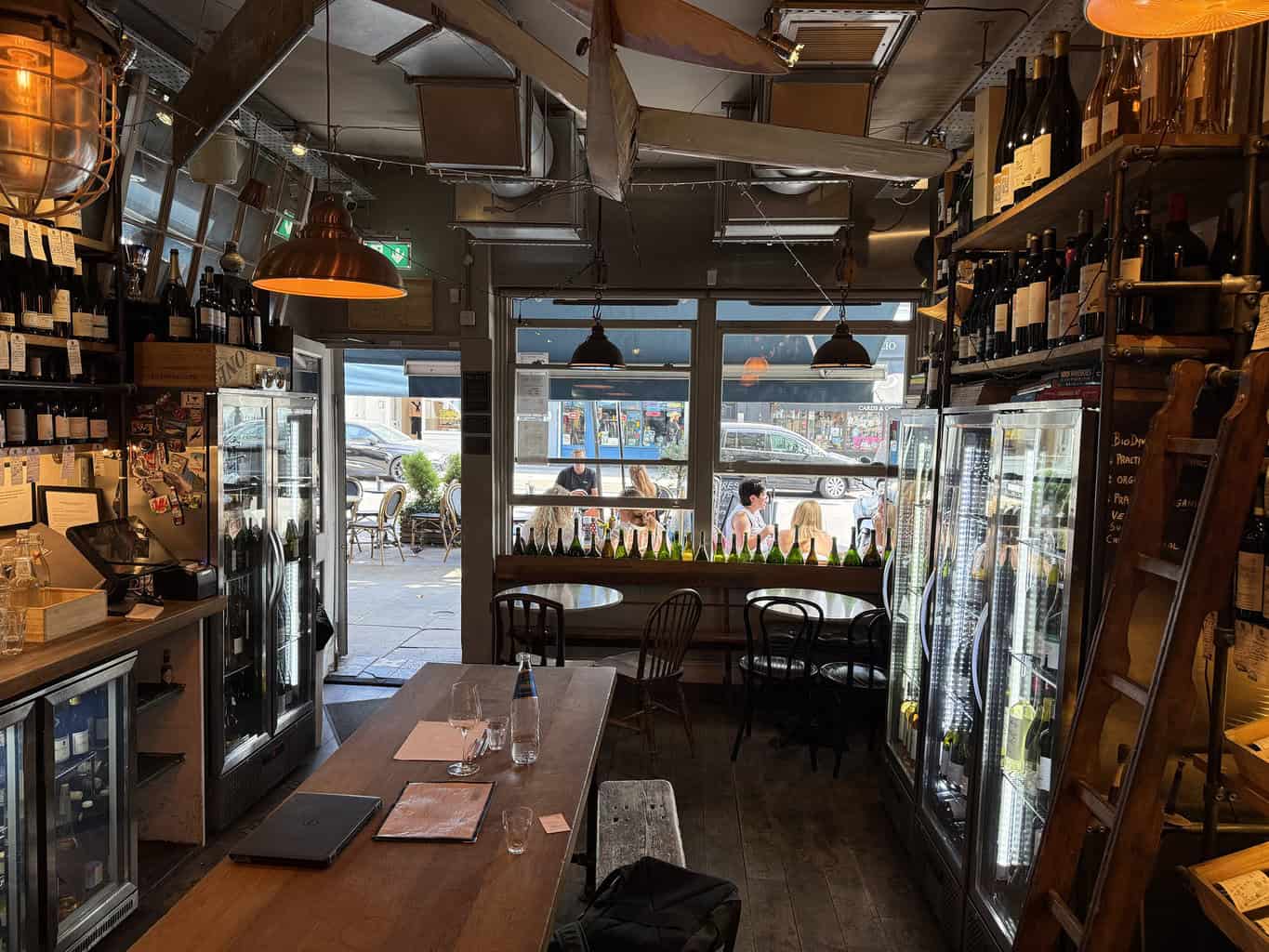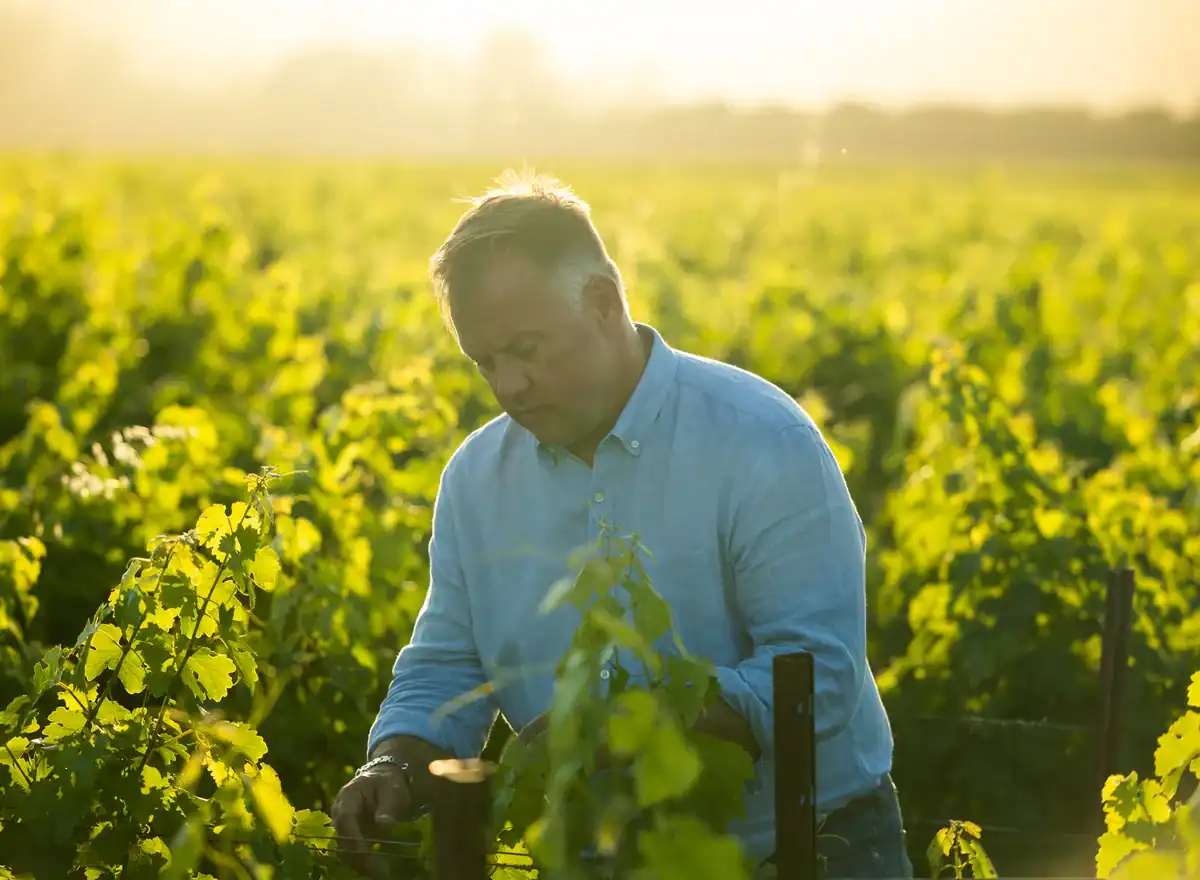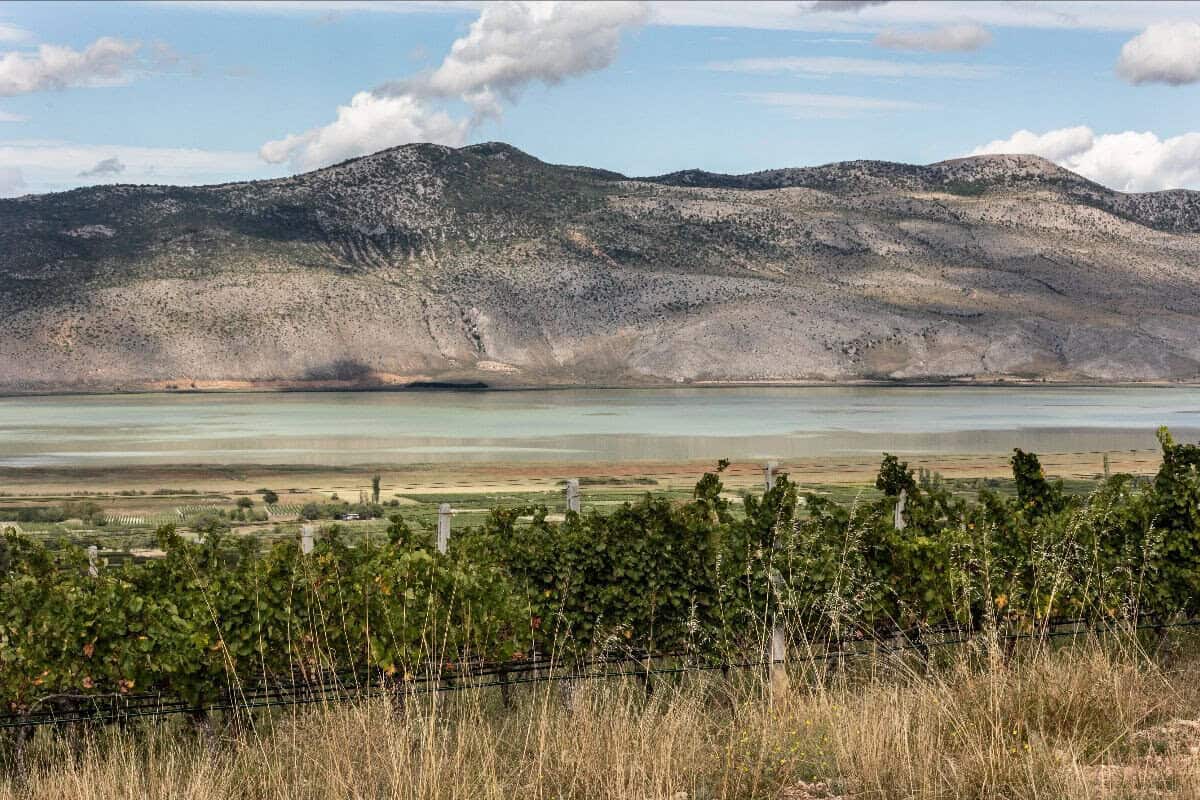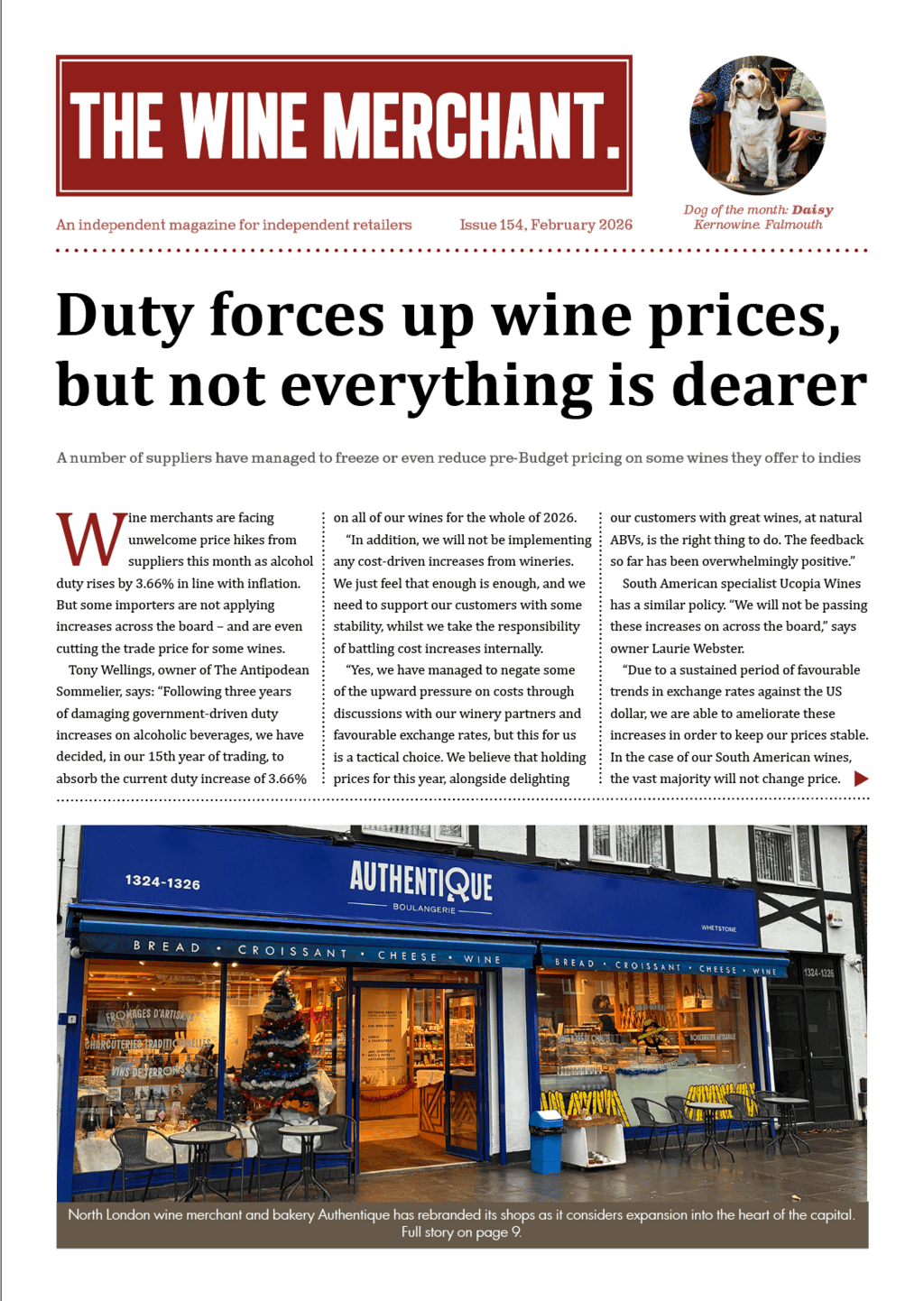Golborne Wine & Deli now takes its place among Notting Hill’s most beloved institutions. Yet only five or so years ago, it all looked very different, and wine was not a significant part of its mix. That all changed during Covid when its owners snapped up the next-door unit.
Graham Holter has a nice lunch before being shown around by Sam Heathcote
Notting Hill just can’t help itself. On a weekday summer lunchtime, it’s so effortlessly cool, so unselfconsciously multiracial, so lacking in the exhaust fumes and sirens and litter that define many of London’s postcodes that you just want to sit down and take it all in.
That’s exactly what people are doing on Golborne Road, a bustling street of cafés and shops with Portobello Road at one end and Ernő Goldfinger’s brutalist Trellick Tower at the other.
Walk into the deli section of Golborne Fine Wine & Deli and you can expect to be greeted like an old friend before finding a seat outside and taking your time over your bagel or salad.
For the first phase of its life, the business was focused on food, Melburnian Sam Heathcote explains. The fact that his job title is wine buyer and sommelier gives some strong clues about what happened next.
“Georgi [Proykov] and his business partner, Aleks [Loncar], bought the deli 16 years ago,” he says, “and started operating as a café: breakfast, brunch, lunch, coffees, open from 7am to 4pm with an all-day menu. They introduced alcohol a little bit later but it was never a massive part of the business.”
The partners acquired the neighbouring unit in 2015, with the plan of expanding the deli. “But when Covid happened this effectively became a really expensive storage space,” Sam says.
Dennis Drazan Sunjic at Liberty Wines was one of the suppliers who suggested that the business pivot towards wine sales while the pandemic played out, so it could continue to trade.
At the time, Sam was on furlough from his job in fine dining. “I was going a bit stir crazy, so when I told Dennis that I needed to get out of the house, he said, ‘two mates of mine just opened a wine shop, and they probably need someone to give it a bit of direction’.”
Today, wine sales account for about half of all turnover.
What was it like in the wine shop in the early days?
The first two years here were crazy. Just the three of us sitting here every day selling bottles. Some of the numbers that we did were nuts.
Originally the idea was that it would be a segue for me to go back into corporate, but after a month, I sat down with George and Aleks, and I said, “I love the place. I think it’s got huge potential. I’m very happy here and I want to stay.” One thing led to another, and here we are five years later.
The business has gone from strength to strength. I think a lot of that’s to do with the fact that Golborne Deli had already got a very loyal customer base. This is quite an affluent area, and we just needed to convert a bit of that loyal customer base into wine drinkers – or realise who the wine drinkers were.
How long after you converted it were you sure it was going to stand on its own two feet?
Realistically after 12 months. Aleks and Georgi were both adamant that they didn’t want to look too much into numbers within the first year.
We had the luxury of having the deli next door, which was already profitable. As long as I wasn’t completely out of control in terms of spending and expanding the selection … there were only the three of us, so our wage overheads weren’t massive.
After 12 months we’d broken even with maybe a little bit of profit, but nothing crazy. In that year we’d probably tripled our range from the original 80 or 90 references.
Was that mainly Liberty stuff to start with?
Yes and Liberty is probably still our biggest supplier, but I started to mix things up with some smaller suppliers such as VineTrail and Astrum. More lo-fi wines … I don’t like using the word natural, so let’s say smaller production, less intervention and sustainably farmed wines.
When I select wine, I ask myself: is the juice good? Does it show varietal typicity and have a sense of place? Is it good quality-to-price ratio and will it resonate with our customers?
How do the two parts of the business work together?
It’s a proper hybrid business. Now it’s a wine shop and wine bar. We utilise this space during the winter for people having breakfast and brunch, and sometimes those people convert into wine sales. And it’s the same next door – they feed off each other.
We’ve got all these different revenue streams so it means we’re not so reliant on one. I think it would be hard to have just a wine shop that didn’t have a wine bar. The natural evolution of the business means that we get repeat custom with people coming in multiple times a week and sometimes multiple times a day. They’ll come in for a coffee in the morning, and they’ll come in for a wine at night. It’s the sort of DNA of the two places.
How many people work here on the wine side of things?
We sort of mix it up because the roles used to be very separate. My idea was to get people that could easily work on both sides. Although a large part of our revenue during the day comes from the deli side of things, especially on weekends, if you can sell the occasional glass of wine on a Saturday or a Sunday while someone’s having their poached eggs, then so much the better.
We have Frankie [Merlo] who joined us towards the end of Covid. He’s taken that sense of ownership that I think everyone here does. That’s really important to us because what keeps the customers coming back is personalities. Frankie and I are full-time and we have one full-time chef and we’ve got four casuals.
the reality is people are still very price sensitive around here. We’re not at the southern end of Notting Hill. We’re not on Westbourne Grove
This is an affluent area. Is that reflected in what customers are happy to pay?
It’s not like they’ll pay anything and we can sell anything. We’re still really focused on our price points. Our entry for wine by the glass is around £7 or £8. We have got some things like Meursault and second-growth Bordeaux on the Coravin at around £30 a glass. But the reality is people are still very price sensitive around here. We’re not at the southern end of Notting Hill. We’re not on Westbourne Grove, and we’re acutely aware of that.
Do you offer discounts?
People come in here a lot and ask if we do discounts on cases, and this and that. We’re just very honest and we explain we’re an independent and we don’t do discounts. The government’s not making life any easier with wages going up, with National Insurance contributions, not to mention all the other overheads.
But we do really take care of our regulars – those guys who come in weekly or daily. We’re very generous with them because that’s really important. We give them the occasional bottle or glass, or food.
How much do you charge for corkage?
We charge a flat rate of £15 a bottle, no matter if it’s a premier cru at £125 or a Fiano from Sicily, you just pay £15 to drink in. Obviously that takes into account wages and glassware.
We want people to understand the value. Having a background in hotels and corporate, you realise that you put these wine lists together and you put stupid margins on them, because the accounts department is expecting 85% or 90% GP, and that’s just not sustainable. As a result you’re going to have a lot of wine just sitting around gathering dust.
That’s exactly the opposite of what we want to do here. We want to sell everything and have high turnover and that allows us to have a much more dynamic selection.
How often do you mix up the range?
We make seasonal changes, so every three months about 70% of the range will change. But we’re always chopping and changing. Every month or two, there’s two or three new wines.
What kind of stuff has proved popular?
Chilled red. As an Australian, that’s something I’ve always drunk but it’s definitely taken off over here in the past couple of years. We’ve got a Grolleau from the Loire at the moment and a gently extracted Saperavi from Georgia. We always have a couple on the go, plus bottles. We always have an orange wine by the glass, but when people ask for an orange wine there is no thought process of which orange wine and how long was it macerated. But we do sell a lot of orange wine.
Do you change the way you display the wines?
Because I’d never had any retail experience, when I originally started to put the selection together and organise the shelves, I basically laid it out how I’d been taught to lay out a wine list. So it was by colour and then geographically.
In France, for example, you start in the north east in Alsace, and then you work in a sort of clockwise direction, effectively, around France. So you go from Alsace to Jura to Burgundy, to northern Rhône, southern Rhône, Languedoc, and then you come up south west: Bordeaux, Loire. Italy’s more north to south. Australia’s west to east, like you would read a book.
Just last week, we changed our orange selection so our orange skin contact and pét nat selection are all in one spot rather than spread by country. It was Frankie’s idea because people ask where the orange wine is, so instead of saying “it’s there, there, and over there”, it’s all in one place.
Are you excited by wines from eastern Europe?
Definitely. Georgi is from Bulgaria and Aleks is from continental Croatia and we’ve just started to bring in a couple of things from there. It’s a super-exciting area because historically that’s the heartland of ex-Yugoslavian wine production. But I think now if you speak to anyone in the wine industry, they would say that if we think about Croatia, we think about Istria, and probably the Dalmatian coast. But there’s amazing wine coming from the continental part – the bit that’s wedged between Hungary, Serbia and Bosnia-Herzegovina.
We’ve started importing Graševina, otherwise known as Welschriesling, the most widely planted variety in in Croatia. Part of the business that we’re going to start to expand is bringing in wines from our home nations of Croatia, Australia and Bulgaria.
Will that be to sell here or will those wines be going to your wholesale accounts?
We’re quite conservative in our growth and we’re lucky that we’ve got a route to market straight away so we can bring in pallets because we know we can sell them here. We’ve got a couple of wholesale accounts, and that’s definitely a part of the business we’re looking to expand.
In the warmer months, it’s probably 70% or 80% on-trade. In winter, it almost flips on its head
How much of the wine turnover comes from drinking in?
In the warmer months, it’s probably 70% or 80% on-trade. In winter, it almost flips on its head. From the end of daylight savings, we don’t get the gazebos out, so we lose seating capacity but we have a lot more retail.
We are at maximum capacity with the deli. On a weekend we might do 500 covers for breakfast or brunch out of that tiny kitchen. And there’s takeaway with people getting coffees and everything else; you couldn’t physically do any more.
With the wine, we’ve seen growth. And you do have potential for people spending £500 or £1,000 on wine. Not that it happens often, but occasionally we’ll sell some first growth Bordeaux or grand cru Burgundy. People come in and buy a few cases and we deliver locally.
What we’ve learned is that the hybrid business model is really important. It’s having all of those revenue streams in place. We’re open from 7.30am until 10pm, seven days a week. Apart from Notting Hill Carnival and Christmas Day, we’re open. And I think that’s an important part of the business as well, because people know that they can come here whatever day and have a coffee or have a glass of wine. You’re paying rent anyway, I mean, it’s not like your rent stops when you close for a Monday.
Do you get reps coming to you all the time, or do you manage to get out and about to tastings?
A bit of both. Frankie goes to a lot of tastings. I try to but it’s a bit complicated now because I’ve got a four-month-old at home, so you have to pull the handbrake up a little bit. A lot of our account managers are people that I’ve had relationships with for a long time, and we’re lucky in the respect that a lot of them come to us now. They want to have their wines on the shelves. We probably have at least two, three tastings a week minimum.
Tell us more about the neighbourhood.
Georgi: It’s really moving in an upwards direction. Everybody seems to want to find property on Golborne Road. There have been some massive developments behind us, which has helped. But the rents … because everybody wants to be in these stores, people are starting to charge ridiculous rents, which is going to hit us at some point.
I think the positive is that there are a few council-owned premises to let and they are very careful who they put in. They don’t necessarily accept the highest payer because they want to keep the range of independent shops in the high street. For example there’s a property just been let out to a tea shop and I know for a fact there were about 35 different people applying for that premises, but there wasn’t already a tea shop.
Sam: People ask us if nearby restaurants like Straker’s affect our business, and I’d say yes – it brings more people to us. They don’t take reservations, so we get a lot of people coming here for a drink while they wait. Sometimes in a night we can turn the table up to eight times – just two glasses of Champagne, it’s 30 quid, and they’re gone in 20 minutes.
At the weekends it’s Portobello market, so we’re lucky with footfall. I think we’re in a really fortunate position that Golborne Road is becoming a foodie destination with Straker’s, Canteen and Caia up the road.
Could you replicate this elsewhere in London?
I think we could, but you’d have to be really specific about your site selection. We did have a look at a site down towards Holland Park, and it was perfect. It had all the sort of same ingredients. We ended up missing out. But it ticked a lot of boxes in terms of the size and rent, and in terms of the location. We’re still in the process of looking for a second site.
Would you still call it Golborne Wine & Deli, or name it after the street?
I think that’s site dependent. If we got something on Broadway Market in east London for example … if it already had a name, maybe we would keep that but add “deli” or “wine”. I like the idea of if that’s where you are, why not call it that? It’s a conversation we continually have. Golborne Deli feels like a brand in itself. Even prior to Georgi and Aleks being here, for 23 years it’s been like a centre point for the community: artists and locals coming here to drink coffee and chat, to just shoot the shit, and it still feels like that now.







